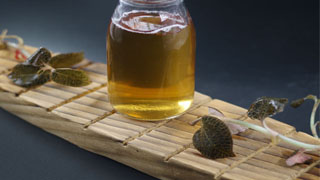
Due to unhealthy eating habits, unsafe food sources, and unhealthy lifestyle habits, modern people have seen an increasing number of cancer patients, with a trend towards younger age groups. It can be said that this is alarming. In the daily outpatient process, many patients and their families often ask the question: Can traditional Chinese medicine really treat tumors? In fact, the question is a difficult one. There are many modern methods for treating cancer, and there are also many options. In the early stage of cancer treatment, traditional Chinese medicine can be used for rehabilitation, while in the middle and late stages, a combination of Chinese and Western medicine is needed. Remember that the intervention of traditional Chinese medicine is necessary and very effective. Are there any ancient anti-cancer formulas commonly used in clinical practice? Next, I will share with you an ancient formula called "Wu Cao Yin", which contains 5 herbs that can help fight against tumors. However, if you really get sick, you need to consult a senior traditional Chinese medicine practitioner for targeted adjustments and treatments in order to achieve twice the result with half the effort.
【 Composition of Tea Recipe 】
15 grams each of Xianhecao, Hedyotis diffusa, Prunella vulgaris, Eclipta alba, and Leonurus heterophyllus
Boil water according to the above ratio as tea, and add Curcuma zedoaria to increase the effect of promoting blood circulation and removing blood stasis
Analysis of Tea Recipe
Hedyotis diffusa has the effects of clearing heat and detoxifying, promoting blood circulation and reducing swelling, diuresis and yellowing, enhancing immunity, protecting gastric mucosa, and antioxidation. Hedyotis diffusa is widely used in cancer treatment.
Dried lotus grass mainly has the effects of nourishing the liver and kidneys, cooling blood and stopping bleeding, clearing heat and detoxifying. Modern pharmacological research has shown that extracts from dried lotus grass can protect the liver and regulate the body's immune function. Xianhecao has the effects of nourishing and tonifying the body, fighting cancer and relieving pain, nourishing blood and stopping bleeding. Modern pharmacological research has shown that Xianhecao also has anti-cancer pharmacological effects such as cytotoxicity, induction of cell apoptosis, prevention of normal cell carcinogenesis, anti-tumor metastasis, regulation of human immune function, and influence of oncogene expression.
Yimucao has a mild qi and a slightly cold nature. It has a bitter and pungent taste and belongs to the liver, pericardium, and bladder meridians. It has the effects of promoting blood circulation, regulating meridians, clearing heat and detoxifying, diuresis, reducing swelling, and removing blood stasis to generate new energy.
Prunella vulgaris enters the qi and has a pungent and bitter taste. It is cold in nature and belongs to the liver and gallbladder meridians. It has the effects of clearing the liver, purging fire, improving vision, clearing heat and detoxifying, dispersing nodules and reducing swelling. It is a commonly used medicinal herb for dispelling tumors.
Curcuma zedoaria enters the bloodstream and is responsible for attacking tumors, promoting qi to break blood, reducing accumulation and relieving pain, which can alleviate the physical pain symptoms of cancer patients; The combination of summer dry grass and turmeric can treat both qi and blood.
【 Health benefits 】
In clinical practice, Wu Cao Yin is commonly used as a small compound and basic formula in combination with other traditional Chinese medicines to treat various malignant tumors. When treating lung cancer, it is often combined with Zhejiang Fritillaria, Bai Mao Teng, Job's tears, Pinellia ternata, etc. Xianhecao can converge and stop bleeding, and Xianhecao and jujube are commonly used to treat hemoptysis in lung cancer with significant effects. Xianhecao is used for reducing white blood cells caused by bone marrow suppression after radiotherapy and chemotherapy. It is often combined with Xiantao grass, Beisha ginseng, Tianfen pollen, Ophiopogon japonicus, Huangqi, etc; Platelet reduction, often combined with Polygonatum sibiricum, Forsythia suspensa, Polygonum multiflorum, Ligustrum lucidum, etc. It is worth noting that high-dose use of Xianhecao mainly causes gastrointestinal reactions and neurological toxicity, which can lead to optic neuritis and blindness. After taking the medication, occasional reactions such as nausea, vomiting, diarrhea, dizziness, sweating, etc. should be avoided in high doses.


